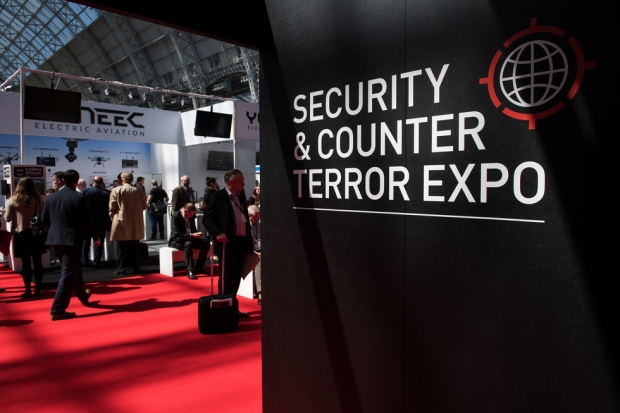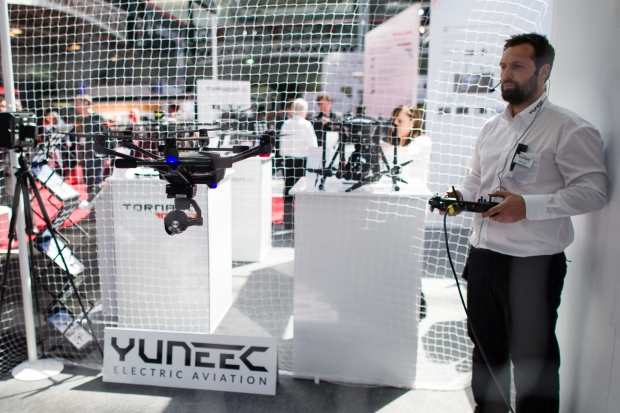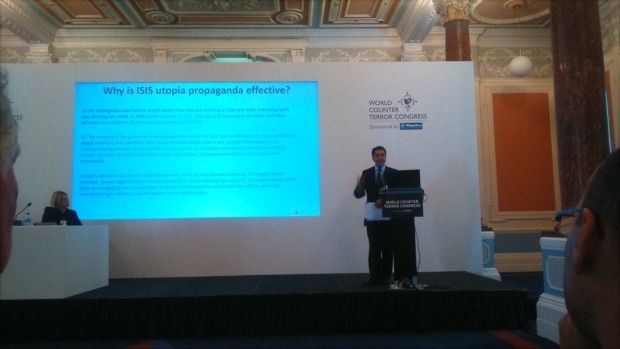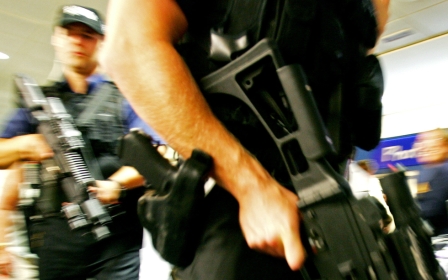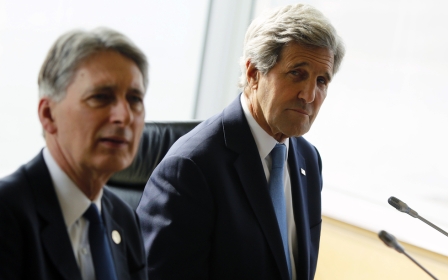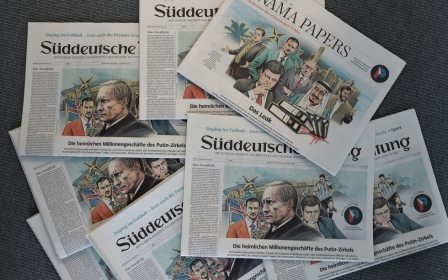Drones above, tours of 'extremist' minds and cupcakes: Welcome to the terror expo
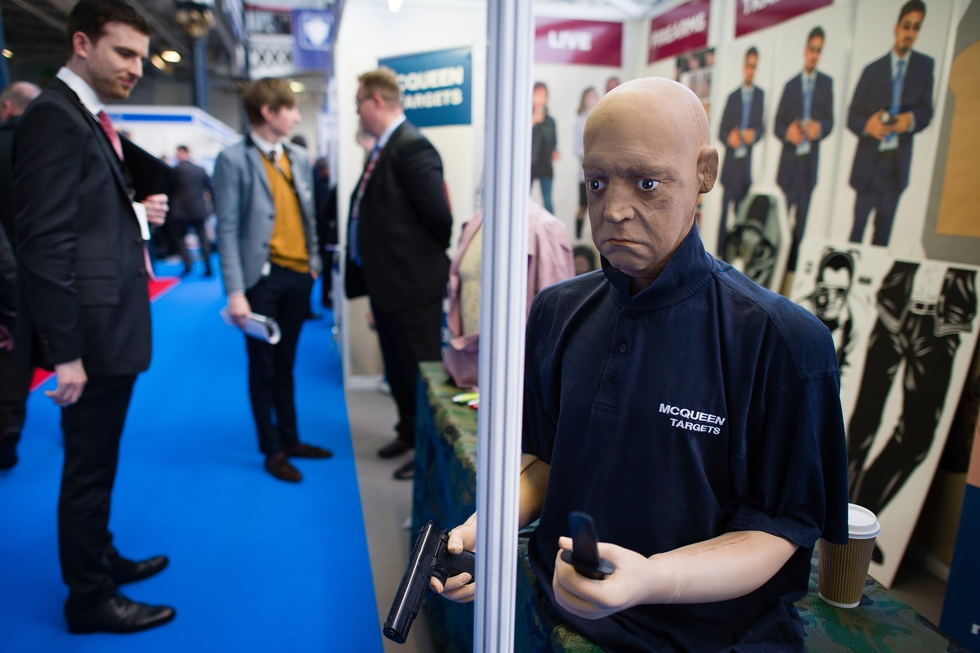
LONDON - A group of potential buyers huddle around Steve Wisbey as he shows off the company's latest product, a remote control unit designed to uncover and disable improvised explosive devices (IEDs).
It is the second day of the 2016 Security & Counter Terror Expo (SCTX) bringing together hundreds of companies that have seen their net worth rocket as countries and individuals have scrabbled to protect themselves in the wake of recent terrorism attacks.
Held at the Olympia venue in west London, the conference is a typical boys-with-toys event (and, yes, it is overwhelmingly men). Dodging roaming mini-robots and blokes in spiffy suits, several men in army fatigues prowl between the stalls. A lone individual wanders the venue in a hazmat suit, passing steel-eyed mannequins holding knives and guns.
Overhead, a flock of remote-controlled drones buzz in formation.
“Over recent years there have been significant developments in international terrorism,” the exhibition announced on its website.
“The threat is evolving and is currently at a significantly high level, SCTX serves a vital role in delivering a unique environment in which the issues may be debated and the counter-measures developed.”
Although the second day was focused on drones (even though the official International Drone Day takes place on 7 May), Wisbey, the managing director of NIC Instruments Ltd, had his customers in a scrum to talk IEDs.
Nearby, several stalls, slightly disorientatingly, gave away cupcakes. Others appeared to have bottles of whisky and shot glasses ready for any inquiring observer.
I asked Wisbey if anxiety over terrorism attacks had led to more customers and sales.
“That’s been going on since 9/11,” he said in the affirmative. “A lot of people who weren’t originally equipped to deal with these sort of issues, have suddenly felt the need to buy much of this equipment.”
“It goes up and down. That guy I was just talking to was Saudi. Saudi have got no money at the moment because of the oil prices, all their projects are on hold.”
However, he said there had been “a massive, massive increase over the last 15 years".
Blast doors, canine services, cybersecurity and bomb disposal - the security-minded customer was in luck at the expo. And increasingly, says hostile environment trainer Paul Mammatt, as the scale of the threat to national security and commercial interests is realised, that will include most of us.
A poll by Gallup in December 2015, following the November attacks that left 130 people dead in Paris, showed “terrorism” as the number one concern of the American public.
“I think that’s to come,” said Mammatt of Pencari, which provides training for military and police agencies. “I think it’s taken people a while to identify that they need this.”
'Muslim extremist' mind tour
In addition to the main conference was the grandly titled World Counter Terror Congress, featuring a raft of speakers offering their views on the threat from global Islamic militancy, with particular focus on the Islamic State group.
Despite the high-tech equipment on display, the speakers were very keen to emphasise the need to counter the group's ideology and high-quality propaganda with more intangible methods.
Marc Hecker, of the French Institute of International Relations, pointed out that in many respects, the UK was ahead of France in terms of on-the-ground engagement and better understood the need to engage with Muslims on their own terms.
“[The French] do not want to deal with religious issues... there's no theological argument at all,” he said. “And I think that's a weakness.”
Similarly, Matthew Collins – a representative from the UK Home Office which heads up the government's Prevent strategy for de-radicalisation – said that it was important for counter-radicalisation specialists to set a "high bar" in terms of who they were willing to work with, including being willing to speak to conservative Muslims who might be perceived as holding sympathies as IS.
"Some will be very interested in the ideological and theological side of things and how we deconstruct those arguments through the campaigns they want to run," he said. "Others will be more interested in countering some of the tone and thrill-seeking and some of the recognition that they see in that sort of propaganda."
He said that, according to their figures, more than 800 UK residents of "security interest" had travelled to Syria or Iraq since the previous conflict began. Half had returned, he said.
Collins also stressed the need to counter some of the negative perceptions that had arisen in the wider society about Prevent - typified by a recent vote at the National Union of Teachers conference for the programme to be scrapped as a result of the impact it was having on teacher and their pupils.
Next up was the Quilliam Foundation, a counter-radicalisation organisation made up of liberal counter-terrorism advocates and former Islamists, who have been close to government advisers on radicalisation though the Home Office stopped funding them in 2010.
Adam Deen, previously a member of the now-banned al-Muhajiroun organisation - spoke of his experiences being radicalised, including driving through East London cheering after 9/11, and led the audience through a slideshow called “Mind of a Muslim Extremist".
“Anyone aware of the organisation Hizb ut-Tahrir, raise you hand?” he asked, referring to the controversial, though non-violent, Islamist group advocating the establishment of a global caliphate.
A smattering of tentative hands went up.
“That’s good - only a few,” he noted. He said the group, like other Islamists, had developed a them-and-us mentality.
“For those of us who are aware of their literature, it’s very much immersed in this kind of binary output - so what happens when you have this kind of binary output and you create this ‘othering’ process, what that does is you start seeing others - non-Muslims and Muslims that disagree with you - you start seeing them as objects, in philosophy the term is epistemic objects.”
He didn't explain what epistemic objects were.
A common strand in Quilliam’s argument is that, unlike previous speakers, they did not believe there was any space either for political Islamists, conservative Salafists or IS fellow travellers in the counter-radicalisation process.
The organisation's managing director, Haras Rafiq, used a conversation he struck up in Australia to illustrate the point.
“I got into this interesting debate with this guy who said ‘Let’s use people who are non-violent extremists, Salafists, Muslim Brotherhood to try to de-radicalise the ones who want to blow us up, because they’re taught the same language [but] they’re not violent.’" Rafiq said.
"And I said: ‘Would you fund the British National Party to de-radicalise Combat 18?’
“That’s exactly one of the things other countries are doing. They’re looking at disengagement and containment, but that’s a ticking time-bomb - we tried that in the UK between 2008 and 2011 and it didn’t work and that’s one of the reasons we have anywhere between 800 and 2,000 people joining jihadist groups in Syria and Iraq.”
“All Islamist organisations at some stage will fight,” he concluded.
Explosive market
The years since 2001, when Islamist terrorism supplanted communism as the major danger facing liberal democracy, have been very good for the counter-terrorism industry - and now it looks set to prosper some more.
UK Foreign Office spending on private security companies rose from £12.6m in 2003 to £48.9m in 2012, according to official data.
Some 14 major private security firms operate out of Hereford near the SAS special forces headquarters, according to a recent report by campaign group War on Want.
The UK's biggest military security company G4S has contracts in the Middle East and Africa running into hundreds of millions of dollars. Its contract to protect Basra Gas Company is worth up to £188m according to War on Want.
The domestic UK market is also booming. On Wednesday, it was announced that over one million people currently working in crowded places in the UK are to be trained by counter-terrorism companies over the next 12 months in how to deal with a possible terrorist attack.
"Police can help explain what the threats and risks to different sectors are, but companies are better placed to explain to staff exactly what action they can take to enhance their security and how to respond if the worst happens," Detective Chief Superintendant Scott Wilson told the BBC.
I asked Dogan Coskun, country manager for the Turkish security company Aselsan - whose products are currently involved in suppressing a Kurdish revolt in Turkey's southeast - whether the current climate of fear in Europe and the wider world had been positive for the counter-terrorism industry.
"We wouldn't say positive, I don't know - we prefer negatively so we don't have these bombs against us," he said. "But in the business case, yes."
A US study from 2013 found that annual security spending, excluding cyber security, had reached $202bn, of which $69bn was federal homeland security spending.
In 2015, UK Prime Minister David Cameron committed his government to spending more than 2 percent GDP on defence, placing an emphasis on the need to protect the country from terrorist and criminal organisations.
Following the November 2015 attacks in Paris, the French government promised to raise its defence spending by $4.3bn.
With the threat of attacks by Islamist militants - and less frequently those by Maoists, ultra-nationalists and "ginger extremists" - spanning the world, security, counter-radicalisation and counter-terrorism experts are going to find no shortage of work to come.
New MEE newsletter: Jerusalem Dispatch
Sign up to get the latest insights and analysis on Israel-Palestine, alongside Turkey Unpacked and other MEE newsletters
Middle East Eye delivers independent and unrivalled coverage and analysis of the Middle East, North Africa and beyond. To learn more about republishing this content and the associated fees, please fill out this form. More about MEE can be found here.


